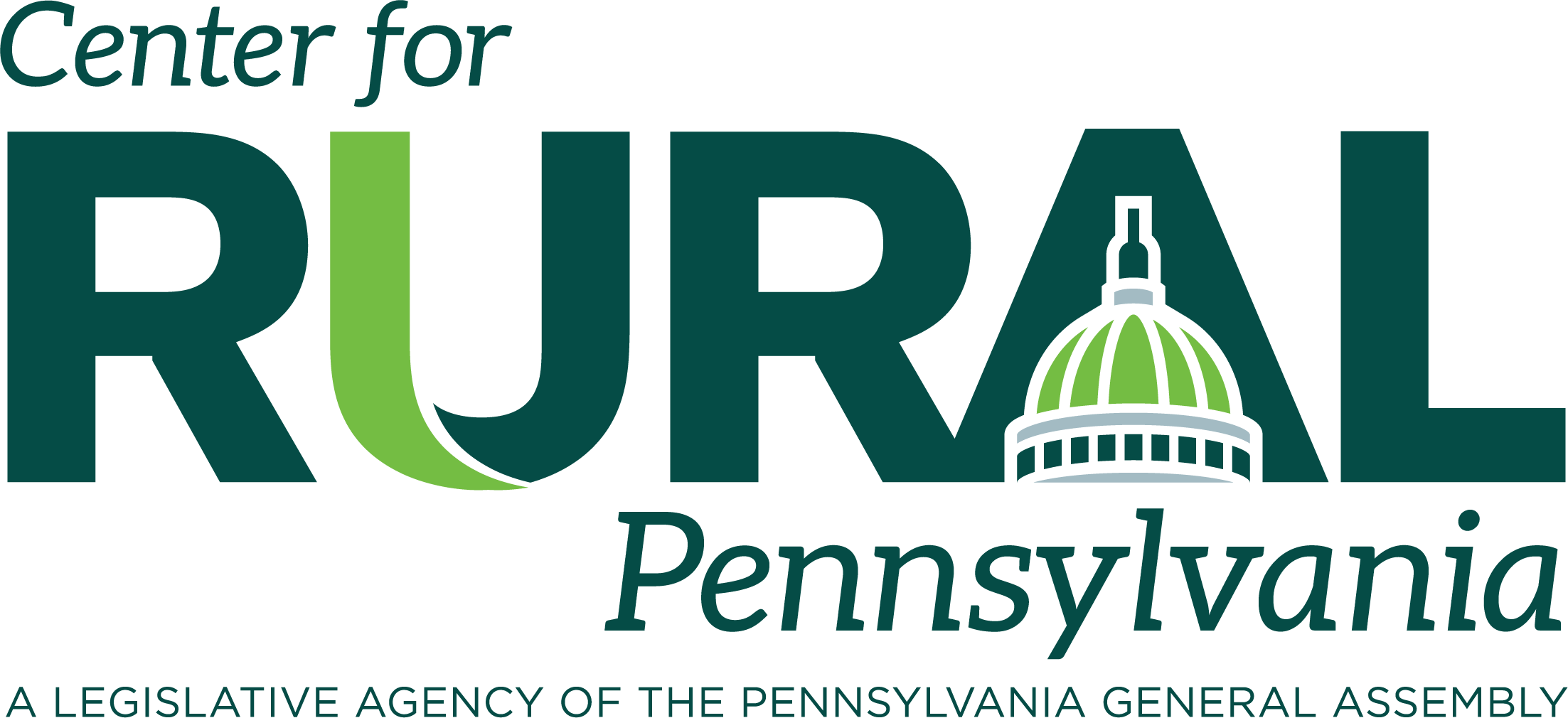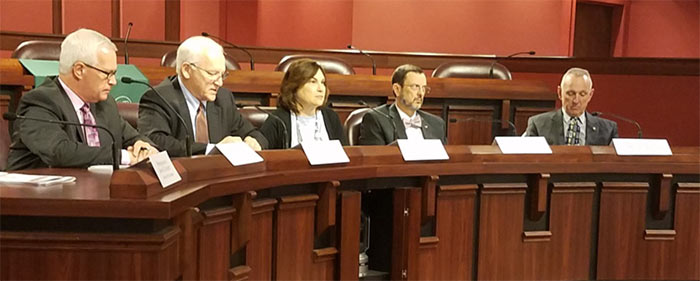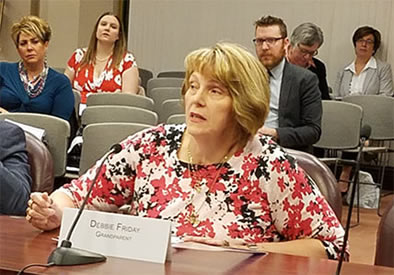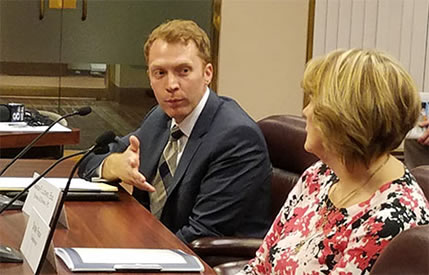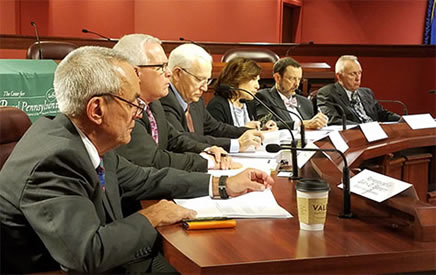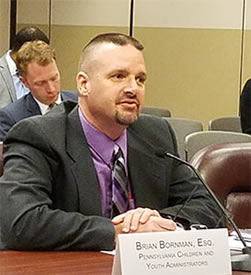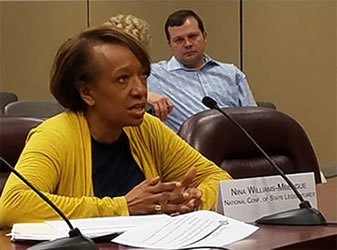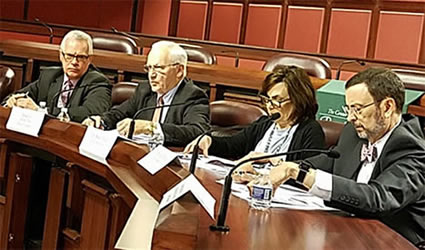State of Addiction Public Hearing
The Center for Rural Pennsylvania held its 13th public hearing on Pennsylvania's heroin/opioid epidemic on Thursday, October 26 at UPMC Susquehanna in Williamsport, PA. Center Board Chairman Senator Gene Yaw, along with Board Secretary Dr. Nancy Falvo, Board Member Dr. Michael Driscoll, Board Member Dr. Timothy Kelsey, and Center Director Barry Denk, hosted the hearing.
The hearing was held to gather information on what is being and has been done at the federal, state and local levels to tackle the state's heroin and opioid epidemic. The hearing was held from 9 am to 1:30 pm.
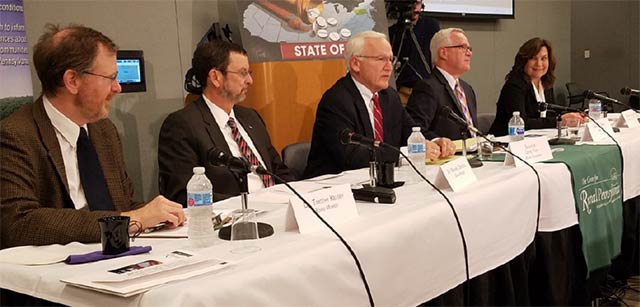
Center Board Chairman Sen. Gene Yaw, center, joined by Board Members Dr. Timothy Kelsey and Dr. Michael Driscoll, Center Director Barry Denk, and Board Secretary Dr. Nancy Falvo, welcomed presenters and attendees to the public hearing.
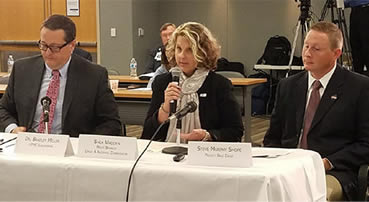
Dr. Bradley Miller of UPMC Susquehanna, right, West Branch Drug and Alcohol Commission Executive Director Shea Madden, and Project Bald Eagle Executive Director Steve Murphy Shope provided updates on the initiatives that each of their organizations/agencies have been undertaking over the past few years to address the heroin/opioid crisis.
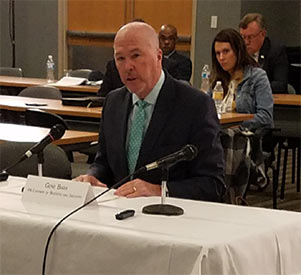
Gene Barr, President and CEO of the Pennsylvania Chamber of Business and Industry, discussed how the crisis continues to impact the workforce throughout Pennsylvania and discussed support for legislation for a workers' compensation drug formulary.
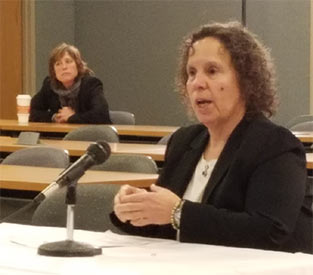
Lycoming County President Judge Nancy Butts provided an update on Lycoming County's Drug Court, which is the 5th oldest in the U.S., and talked about the implementation of its intensively supervised Vivitrol Court. Judge Butts offered several recommendations to help improve the criminal justice response to opioid addiction, including the move toward a more holistic approach to treatment and the allocation of funds to the county adult probation and parole system.
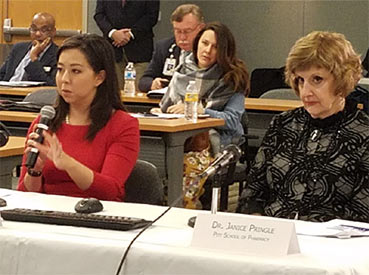
Dr. Janice Pringle (right) and Dr. Lynn Mirigian of the University of Pittsburgh's School of Pharmacy, Opioid Overdose Reduction Technical Assistance Center (TAC) discussed TAC's work in providing technical assistance to 41 Pennsylvania counties since 2016. The TAC helps counties to build collaborative coalitions to reduce overdose in their communities. They noted that several counties are on track to stabilize their overdose death rates for 2017.
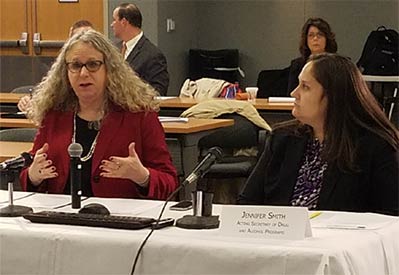
Acting Secretary of Health and Physician General Dr. Rachel Levine and Acting Secretary of Drug and Alcohol Programs Jennifer Smith discussed the increased availability of Naloxone, the further development of the "warm hand-off" process, the implementation of opioid prescribing guidelines, the implementation of the Achieving Better Care by Monitoring All Prescriptions (ABC-MAP) Prescription Monitoring Database Program, the increase in the number of drug take-back boxes statewide, the expansion of medication-assisted treatment and other evidence-based practices, the licensing of additional treatment facilities, and the need to license or certify all drug and recovery houses that receive public funds.
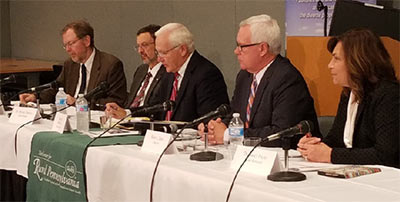
At the close of the hearing, Sen. Yaw thanked the presenters and attendees for participating.
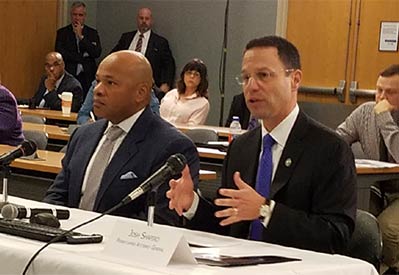
Pennsylvania Attorney General Josh Shapiro and Special Agent in Charge Gary Tuggle of the U.S. Drug Enforcement Administration's (DEA) Philadelphia Field Division discussed what is being done in rural communities and statewide to combat the distribution of illicit drugs. They noted the importance of local law enforcement to combat the distribution of illegal substances, the importance of education to decrease the demand for illicit drugs, and the need for more drug courts, among others. Attorney General Shapiro briefly discussed the multi-state investigation into the role pharmaceutical makers and distributors may have played in the opioid crisis.
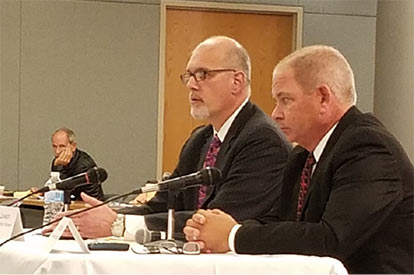
Lycoming County District Attorney Eric Linhardt and Williamsport Police Chief David Young discussed the need for adequate funding for law enforcement personnel and municipal drug taskforces to successfully combat and confront the heroin crisis and for tougher sentences for drug crimes and drug trafficking involving heroin.
"State of Addiction" Public Hearing Set for Oct. 26
HARRISBURG - The Center for Rural Pennsylvania, chaired by State Senator Gene Yaw, will hold a public hearing in Williamsport on Thursday, October 26 to gather information on what is being done at the federal, state and local levels to tackle the state's heroin and opioid epidemic.
Senator Yaw will preside over the hearing and will be joined by fellow Center Board Members Vice Chairman Representative Garth Everett, Board Secretary Dr. Nancy Falvo of Clarion University, President of Indiana University of Pennsylvania Dr. Michael Driscoll and Penn State Professor Dr. Timothy Kelsey.
Presenters are Pennsylvania Attorney General Josh Shapiro, Pennsylvania Acting Secretary of Health/Physician General Dr. Rachel Levine, Pennsylvania Acting Secretary of Drug and Alcohol Programs Jennifer Smith, U.S. DEA Special Agent in Charge Gary Tuggle, Lycoming County President Judge Nancy Butts, University of Pittsburgh School of Pharmacy Dr. Janice Pringle and Dr. Lynn Mirigian, Lycoming County District Attorney Eric R. Linhardt, Williamsport Police Chief David Young, West Branch Drug and Alcohol Commission Executive Director Shea Madden, Project Bald Eagle Executive Director Steve Murphy Shope, UPMC Susquehanna Dr. Bradley Miller, and Pennsylvania Chamber of Business and Industry President and CEO Gene Barr.
"The goal of this hearing is to bring people back to the table to find out where we are today in combating the heroin and opioid epidemic that continues to devastate our rural and urban communities," Yaw said. "Are we any better off today than we were three years ago?"
In 2014, the Center held its first public hearing on the heroin and opioid crisis affecting the Commonwealth. That hearing, also held in Williamsport, was followed by 11 additional public hearings over the next two years. Those hearings created statewide awareness supporting and resulting in numerous legislative and administrative initiatives to combat a disease that now claims more lives each year than those lost to traffic accidents.
"Every day throughout the U.S., 150 people die from a drug overdose," Yaw said. "150 lives lost every day. We can't allow this epidemic to continue to do this to our communities."
The public hearing will be held in the Walnut Conference Center at UPMC Susquehanna, 700 High Street, Williamsport, PA 17701 and will begin at 9 AM.
Members of the public and media are invited to attend.
The Center for Rural Pennsylvania is a bipartisan, bicameral legislative agency that serves as a resource for rural policy within the Pennsylvania General Assembly. The Center works with the legislature, educators, state and federal executive branch agencies, and national, statewide, regional and local organizations to maximize resources and strategies that can better serve Pennsylvania's nearly 3.4 million rural residents.
Contact
Barry Denk, Director
Center for Rural Pennsylvania
717.787.9555
Yaw Announces "State of Addiction" Public Hearing
HARRISBURG - State Senator Gene Yaw (R-23), Chairman of the Center for Rural Pennsylvania Board of Directors, announced today that the Center will hold a public hearing in Williamsport on Thursday, October 26, 2017 to gather information on what is being done at the federal, state and local levels to tackle the state's heroin and opioid epidemic.
Joining Senator Yaw at the hearing will be fellow Center Board Members Vice Chairman Representative Garth Everett, Board Secretary Dr. Nancy Falvo from Clarion University, President of Indiana University of PA Dr. Michael Driscoll and Penn State Professor Dr. Timothy Kelsey.
"In 2014, the Center for Rural Pennsylvania held its first public hearing on the heroin and opioid crisis affecting the Commonwealth," Sen. Yaw said. "That hearing, also held in Williamsport, was followed by 11 additional public hearings over the next two years, resulting in over 70 hours of presentations from more than 150 professionals, family members, and people in recovery. The hearings created statewide awareness supporting and resulting in numerous legislative and administrative initiatives to combat a disease that now claims more lives each year than those lost to traffic accidents."
Yaw added that the focus of the October hearing is to understand where Pennsylvania is, three years later, in its efforts to confront all of the issues surrounding heroin and opioid addiction. "We are inviting professionals in the fields of law enforcement, the judiciary, treatment and recovery, business and industry, and education and prevention to offer testimony on where we are now in combatting this crisis and where we need to go."
"Every day throughout the U.S., 150 people die from a drug overdose," Yaw said. "150 lives lost every day. We can't allow this epidemic to continue to do this to our communities."
The public hearing will be held in the Walnut Conference Center at UPMC Susquehanna, 700 High Street, Williamsport, PA 17701 and will begin at 9:30 AM.
Members of the public and media are invited to attend and coverage is appreciated.
The Center for Rural Pennsylvania is a bipartisan, bicameral legislative agency that serves as a resource for rural policy within the Pennsylvania General Assembly. The Center works with the legislature, educators, state and federal executive branch agencies, and national, statewide, regional and local organizations to maximize resources and strategies that can better serve Pennsylvania's nearly 3.5 million rural residents.
For more information please contact Barry Denk.
Public Hearing on the Heroin/Opioid Epidemic in Pennsylvania
The Center for Rural Pennsylvania held its 12th public hearing on the heroin/opioid epidemic in Pennsylvania on Wednesday, May 10 at the State Capitol Building in Harrisburg. Center Board Chairman Senator Gene Yaw welcomed board members and attendees to the hearing, which was hosted by the Center's Board of Directors. The hearing focused on the legal, financial and personal issues that grandparents may encounter as they become the primary caregiver for grandchildren whose biological parents can no longer care for them because of a substance use disorder. The hearing was held from 9:30 am to 11:30 am.
Public Hearing: Grandparents Raising Grandchildren
as a Result of Heroin, Opioid Epidemic
The Center for Rural Pennsylvania will hold its 12th public hearing to solicit testimony on the heroin and opioid epidemic in Pennsylvania. State Senator Gene Yaw, chairman of the Center for Rural Pennsylvania's Board of Directors, says this public hearing will focus on grandparents who are caring for grandchildren because their parents are unable to care for them because of heroin/opioid addiction. The hearing will be hosted by the Center's Board of Directors.
According to a 2016 report from Generations United, the rise in heroin and opioid use has led grandparents and other relatives to care for children. The report, The State of Grandfamilies in America: 2016, says that more relatives are raising children because the parents have died, are incarcerated, are using drugs, are in treatment or are otherwise unable to care for their children. Data from the U.S. Census Bureau show that, in 2015, about 88,700 grandparents in Pennsylvania were the primary caregivers for grandchildren living in the grandparents' households. That's a 10 percent increase since 2000, when about 80,400 grandparents statewide were the primary caregivers for grandchildren. In rural Pennsylvania, there was a roughly 28 percent increase in the number of grandparents who were considered primary caregivers over the 15-year period (19,789 in 2000 to 25,264 in 2015).
Since 2014, the Center for Rural Pennsylvania has conducted 11 public hearings on the heroin epidemic to examine the crisis from all angles, including education and prevention, law enforcement and treatment. Senator Gene Yaw, Chairman of the Center's Board of Directors, said the Center will continue to lead the way to educate policymakers, inform the public, and enhance current policies in Pennsylvania related to all aspects of the heroin/opioid epidemic.
For more information please contact Barry Denk.
Center for Rural Pennsylvania to Hold Hearing on Grandparents Raising Grandchildren as a Result of Heroin, Opioid Epidemic
HARRISBURG - State Senator Gene Yaw, Chairman of the Center for Rural Pennsylvania, today announced that the Center, a bipartisan, bicameral research agency of the Pennsylvania General Assembly, will hold a public hearing to look at the challenges faced by Pennsylvania grandparents who are caring for their grandchildren because of the heroin and opioid epidemic.
The hearing will focus on the legal, financial and personal issues that grandparents may encounter as they become the primary caregiver for grandchildren whose biological parents can no longer care for them because of a substance use disorder.
"For more than three years, we have listened to heart wrenching stories of families broken apart by addiction," Sen. Yaw said. "As one testifier noted, addiction causes a chain reaction, affecting the addict as well as family members, friends and coworkers. Like other states, Pennsylvania is in the midst of the one of the worst public health crises of our generation and now, as addiction rates continue to climb, grandparents are on the front lines of the epidemic. This hearing will examine ways that our state can make it easier and less burdensome for grandparents to assume the role of primary caregivers."
According to a 2016 report from Generations United, a Washington, D.C.-based family research and advocacy group, the rise in heroin and opioid use has led grandparents and other relatives to care for children. The report, The State of Grandfamilies in America: 2016, says that more relatives are raising children because the parents have died, are incarcerated, are using drugs, are in treatment or are otherwise unable to care for their children. Data from the U.S. Census Bureau show that, in 2015, about 88,700 grandparents in Pennsylvania were the primary caregivers for grandchildren living in the grandparents' households. That's a 10 percent increase since 2000, when about 80,400 grandparents statewide were the primary caregivers for grandchildren. In rural Pennsylvania, there was a roughly 28 percent increase in the number of grandparents who were considered primary caregivers over the 15-year period (19,789 in 2000 to 25,264 in 2015).
The hearing, scheduled for Wednesday, May 10, 2017, will begin at 9:30AM in Room 8-EB at the State Capitol Building and will feature testimony from: Mrs. Debbie Friday, a grandparent caring for her grandchildren; Aaron F. Ludwig, Esq., of Supinka & Supinka, PC; Mr. Douglas Amsley, Executive Director of Franklin County Children and Youth Services; and Ms. Nina Williams-Mbengue, Program Director with the National Conference of State Legislatures.
For more information please contact Barry Denk.
